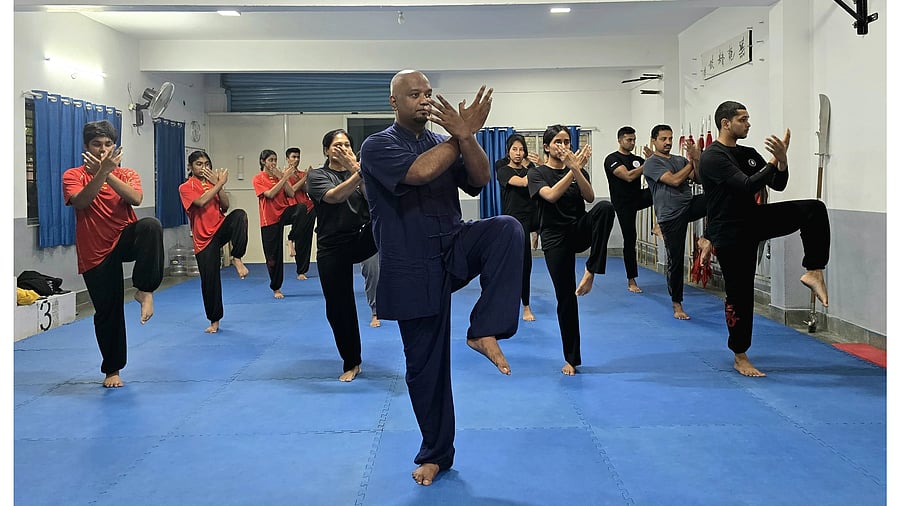
The Shaolin TaiChi and Qigong Institute, J P Nagar, has 80 students aged 18 and above.
Credit: Special arrangement
The interest in tai chi has been gradually increasing in Bengaluru, driven by word of mouth and international exposure, and even with some doctors advising it to their patients. Some centres report more enquiries than before, especially since the pandemic years.
Most students are IT professionals seeking relief from burnout, road rage, and lifestyle issues like frozen shoulder and lower back pain. While tai chi has long appealed to older adults for its gentle, balance-enhancing movements, it’s increasingly drawing people aged 22-50, including sportspersons and dancers, who seek better focus and flexibility.
Corporate professionals form the bulk of students at Fu Sheng Yuan Tai Chi Academy’s Bengaluru branch on St Mark’s Road. Decoding the appeal of tai chi in a country with a strong yoga tradition, its founder, sixth-generation master Sifu George Thomas, says it integrates hatha yoga, pranayama, and raja yoga, thereby addressing movement, breath, and meditation in one synchronised flow, much like composing a piece of music. He says the benefits go beyond the visible — it supports cardiovascular health, the nervous system, digestion, and overall immunity. It’s an exercise for both the mind and body and even offers a path to spiritual growth, he continues.
The Chen Zhaosen Taiji School India Chapter in Koramangala is currently training about 50 students aged 9 to over 70, including techies, doctors, media professionals, and homemakers. One of the instructors, Jhanvi Radia, says 80% of them have been practicing with the school for 20 years and report better immunity. “A former student rejoined this year after developing an eating disorder,” she says. Speaking of another student, she says a man who came in with mobility issues after hip replacement surgery now walks as if it never happened, courtesy 10 years of practice.
At the Shaolin TaiChi and Qigong Institute in J P Nagar, many of its current students are over 50 and they had come in with knee pain, ligament tears, flat feet, hypertension, diabetes or post-surgery mobility challenges. In the past, bodybuilders have signed up to improve flexibility, while tennis players, swimmers and shooters have taken classes to strengthen balance and manage performance pressure. “Tai chi looks deceptively simple but makes you really sweat because it works all muscle fibres (slow and fast-twitch). This is unlike explosive moves that only make use of fast-twitch muscles,” says founder-instructor Shifu Keerthi B S Prasad (Shifu and Sifu both mean master).
At the Institute of Wellness and Martial Arts, a chain, half the students are aged 40-50 and seek a meditative practice, 10% are children enrolled for calming benefits, and the rest are seniors referred by doctors. Instructor Krishna Kumar recalls a man with a hernia who, before joining tai chi, hesitated to climb stairs, jog, or run. After years of practice, he now feels “active”. “We get two-three new students a month, and only one takes up advanced training,” he says.
At the National Martial Arts and Fitness Academy, Kaggadasapura, trainer R Prabakaran says most of his students are above 35, with 5-10% being sportspersons. Here too, it’s student experiences that attract others.
However, instructors warn of a rise in quacks. Prasad says he rejects 40% of enquiries, often from yoga teachers or gym trainers looking for quick trainer certification. Thomas echoes the concern and urges students to find instructors trained under authentic masters, or at world-class academies.
Research
Harvard Medical School backs the benefits of tai chi — from pain relief and fall prevention to improved mood, cognition, and heart health. It also offers a beginner-friendly programme, ‘An Introduction to Tai Chi’, in print and ebook formats. However, orthopaedicians Metrolife spoke to were unfamiliar with these claimed benefits and had never recommended tai chi to patients.